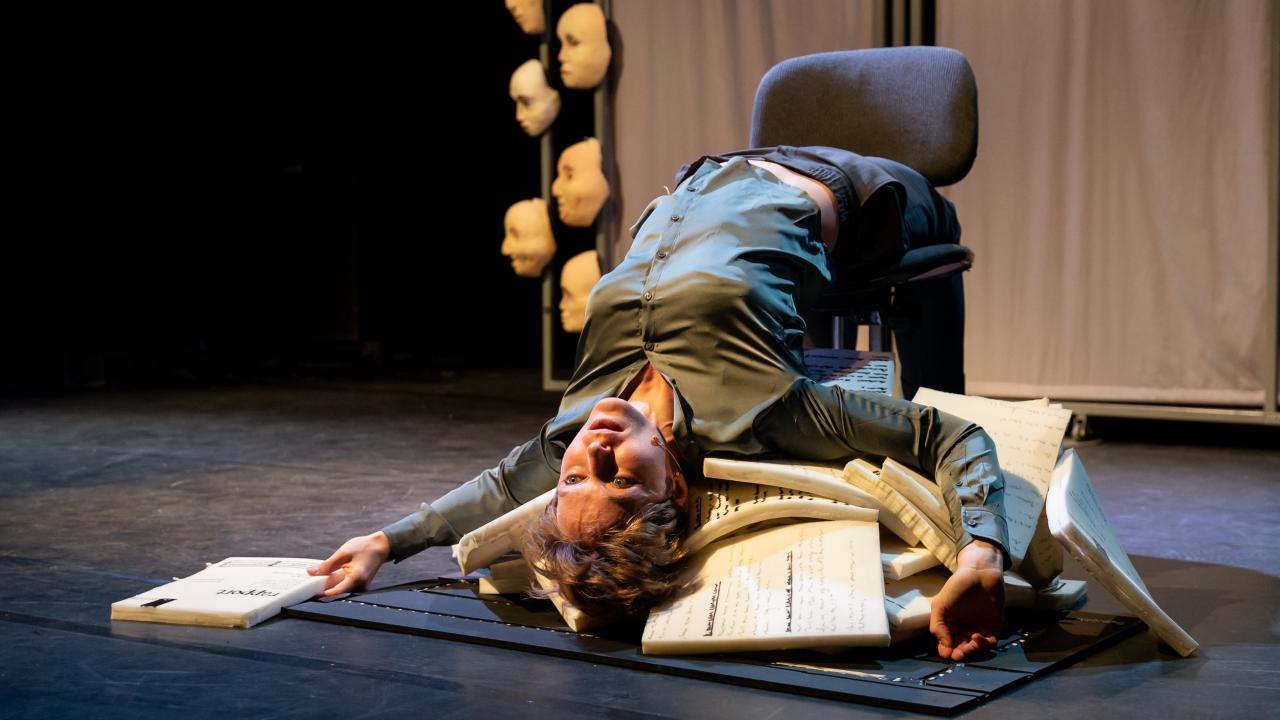the borders within
critical review of Borders (Grenzen) by Cat Smits Company (Netherlands). work presented during the 10th International Festival of Puppetry Schools PUPPETNOPUPPET (LALKANIELALKA) in Bialystok, Poland, on June 2022. this text is written by amilton de azevedo within the context of the Puppet Theater Criticism Workshop offered by the International Association of Theater Critics (IATC).
Nine masks share the same body for the first image on “Borders” (“Grenzen”), from Cat Smits Company (Netherlands). Once they start dialoguing, one can easily recognize the idea of a totally dehumanized collective being that represents state-organized institutions, with their strict policies and heavy bureaucracy that leaves little or no room for actually not only listening to people’s requests and reasons but also to actively help them.
The plot develops within the borders of this place that should work like a bridge between realities: an immigration control unit focused on analyzing refugee’s requests for citizenship – considering the home country of Cat Smits, assumably the Netherlands. There, the institutional logic is quite the opposite from other customs checkpoints, since it is not about having hotel bookings, enough money and a ticket back to your homeland but, as the dramaturgy is constantly reaffirming, being as marginalized, persecuted, and/or in danger as possible.
Chit-chat between that place’s workers reveal how their impressions – and prejudices – can be built even when dealing with such sensitive matters regarding one’s destiny. Being in positions of authority can really change an individual’s subjective way of perceiving life and human relations. Smits will be playing all parts with the help of masks, puppets, her microphone and usage of external voices to represent the other characters brought to life through her manipulation.
The audience is presented with two versions of Andy, the main character: with her mask on, as a direct representation of her professional function, she would be the one conducting interviews with the one seeking asylum in the country, following procedures and keeping an empathetic approach – within some well-established (and constantly reminded by her boss) borders. The performance’s name, with a obvious and direct meaning upfront, becomes more than a geopolitical one: “Borders” are the ones surrounding nations, narrowing our perspectives upon humankind, limiting our possibilities on acting towards real changes in society and, maybe the most profound and irreversible one, shaping our subjective mind onto pessimism and a complete powerless feeling as an individual being.
When Andy talks directly to the audience, the masks are off – literally and symbolically. Spectators can gain access to the chaos within someone appointed to occupy a life-changing work position in the most trivial way possible with a major disregard on other people’s particular sufferings. Her mind (and spirit?) would be drifting through times, identities and projections on the effects generated by her first decision in the job.
After a really strong moment of “Borders”, Smits will reveal the other side of the puppet that represents the interviewed citizenship candidate: when she holds onto that paper filled with words, it is possible to think about Andy’s sudden realization of her own condition about herself being puppeteered by the strings of the system. On the other hand, it is also a powerful reminder that one’s identity and life trajectory can never be resumed into words written within the borders of bureaucracy.
As a Dutch artist, Smits does realize since the conception of the work from where it was possible for her and her companions to approach this issue: by understanding their position, they were able to put together a truly honest, reflexive and plastically beautiful performance. Even though the focus is launched upon this individual characther’s crisis triggered when faced with the sheer reality of world’s inequality and specially sexuality-related issues and prejudices, “Borders” organizes itself as an important political piece.
What are the masks that one’s forced to wear in their daily routine and what is one’s identity underneath it? If even the ones entitled with authority positions are struggling, what about the ones without any real – or even pseudo – agency regarding their own life. As individuals, will we always be surrounded by the illusion of transformation possibilities and the powerless feeling of impossibility?
[be a supporter of amilton de azevedo’s critical production: meet the continuous crowdfunding campaign keeping the ruin alight!]

